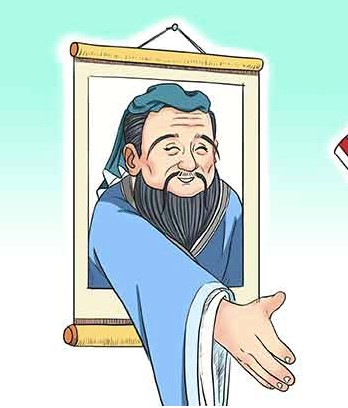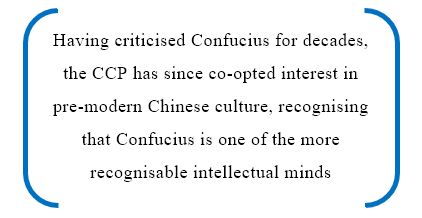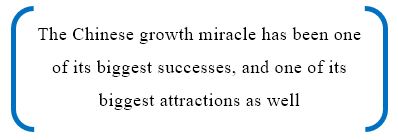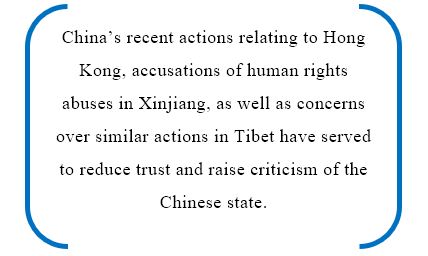Aadil Sud, Research Intern, ICS

In politics, soft power has often been described as the ability to be able to persuade or attract other political actors to support your own interests. It shuns the traditional carrot and stick approach, and strives to attract and co-opt, rather than coerce, seeking instead to achieve influence by building networks and making a country naturally attractive to the world. The most popular definition of this concept was given by Joseph Nye, who stated that soft power was “when one country gets other countries to want what it wants”. Over the years, many different aspects of soft power have been talked about. Some of the most common forms of soft power promotion are a country’s global image, political prestige, and cultural capital.
China is a country that has over the past decades invested heavily in its soft power capabilities, often accompanying its hard power strategies with soft power parlance. A good example of this has been China’s ‘historical’ claims to territory in the South China Sea, which they state had been controlled by China even before the rise of modern nation-states, trying to add more legitimacy to their claims. To date, it has also promoted itself heavily in the fields of diplomacy, education, culture, and economics as well, which have resulted in tremendous returns for them.

Soft power was explicitly referenced for the first time at the seventeenth National Congress of the Chinese Communist Party (CCP) in 2007, where former president Hu Jintao stated that “The great rejuvenation of the Chinese nation will definitely be accompanied by the thriving of Chinese culture”. Xi Jinping was further quoted as saying in 2014 that “We should increase China’s soft power, give a good Chinese narrative, and better communicate China’s message to the world”.
To this end, China has made efforts to increase its diplomatic power, overtaking the USA to have the largest diplomatic force in the world in 2019. It has also made a concerted effort to promote Chinese culture, focusing on language, art, music, and movies. One of its biggest achievements in this has been the spread of Confucius Institutes around the world. Having criticised Confucius for decades, the CCP has since co-opted interest in pre-modern Chinese culture, recognising that Confucius is one of the more recognisable intellectual minds outside of China, and has avoided negative connotations like those surrounding leaders like Mao. Starting in 2004, China began “establishing non-profit public institutions which aim to promote Chinese language and culture in foreign countries”. As of 2019, there were an estimated 550 institutes around the world. This has been part of the push to spread and increase interest in Chinese language education around the world. Another similar push has also been implemented in countries like Nepal, where China proposed covering the salaries of teachers who teach Mandarin, resulting in many schools making learning the language compulsory.

Another aspect of Chinese soft power, in the current world climate, has been touting the efficiency of its system of governance. Before the pandemic, China united countries behind the leadership of Xi Jinping, attempting to usurp the influence of a rapidly declining America under Donald Trump, which was heading towards further isolationism and walking back from previously agreed trade and climate deals. The most important issues where China has strived to integrate itself and replace the role of the USA includes, but is not limited to the Paris Climate Agreement, negotiating with the Taliban in Afghanistan, as well as with trade issues. It has showcased China under President Xi and the CCP as a conscientious leader, willing to sacrifice its own interests for those needed to combat issues like climate change. Since the advent of the pandemic, there has been a renewed interest in showcasing China’s institutional advantage worldwide. With the failures of liberal democracies around the world to control the spread of the pandemic, and with China effectively quarantining the epicentre of the pandemic, registering only around 80000 cases, China’s governance system has been touted as extremely effective in crisis situations.
This, combined with discourse about how a difference in attitudes between the East and the West influenced the handling of the pandemic, have resulted in a highly politicised soft power tussle, with Trump blaming China for the virus, referring to it as the “Chinese Virus”. Conversely, China has also made efforts to shift the blame onto western countries such as France and the USA and tried to raise international goodwill by donating medical equipment and supplies to many countries in need. Along with this, it has also engaged in pandemic propaganda. For example, China mobilised 5000 medicinal practitioners in support of their response to the virus, and proposed vaccines based on traditional Chinese herbal medicines. According to Prof. Ji Zhe, more than 90% of China’s cured cases had made some or the other use of such herbs, very similar to how certain sections of society in India have touted Ayurveda and immunity boosting as effective ways to combat the pandemic. While the effectiveness of such medicines is a separate issue, it has become highly politicised, as it has been portrayed as Chinese products, pushed forward by the CCP, which had been used to save the Chinese people (and can be used to save others across the world).

Finally, with the projected global recession, China has sought to improve its appeal economically as well. This, for them, would improve chances of governments working with the CCP, as a way to boost their economies in the post-pandemic period. This has been matched with a widespread admiration for the way China has successfully transitioned from a low-income country to a middle-income one very rapidly. The Chinese growth miracle has been one of its biggest successes, and one of its biggest attractions as well. For example, the Barbadian Prime Minister David Thompson has expressed admiration for the Chinese economic model and sought to emulate the way Chinese state-controlled banks guided development, both within China, and abroad. This has, in recent years, been combined with their promotion of the Belt and Road Initiative (BRI). China’s economic heft has also been used to promote the One China policy, where countries have been offered low-interest loans with the only preconditions being to recognise the PRC as the ‘real’ China, a method that has been immensely successful for them in the past.
However, the CCP’s efforts to promote Chinese soft power have often been met with many obstacles in the past, as well as currently. For many years, China has been seen as an imperialist nation by many of its neighbours, and by others around the world (due to, for example, its territorial tensions in the China Seas and beyond, with Vietnam, Taiwan, Japan, as well as in Southeast Asia), something that has dampened excitement of integrating with the Chinese growth miracle. This has been exacerbated by allegations and concerns of falling into a debt trap over the BRI, which takes on more concern amidst a pandemic-induced recession, decreasing the pull of China as both an economic and political partner for many. Concurrently, China’s recent actions relating to Hong Kong, accusations of human rights abuses in Xinjiang, as well as concerns over similar actions in Tibet have served to reduce trust and raise criticism of the Chinese state. According to Dr. Victoria Tin-Bor-Hui, international opinion of China around the world currently is at its lowest point since 1989, the year of the Tiananmen Square agitations.
As we can see, China’s soft power, as well as its efforts to promote the same, are something many countries around the world can learn from. The CCP has learnt very effectively, that soft power does not only revolve around Nye’s erstwhile definition of it, but also includes aspects that may have come under traditional hard power tactics. However, we again see the importance of good relations with other countries, as despite all their achievements, China is often portrayed as having several black marks against it, that has served to reduce the willingness and interest of many countries to outright ally with it, as opposed to offering them issue-based support – which is the nature of world politics today. However, China’s pull – culturally, economically, politically, as well as technologically cannot be ignored, and has played a large part in how they have managed to secure a preeminent place in world politics, and solidified themselves as a major actor in issues around the world, providing a direct challenge to the US-based hegemony that we see in our world today.